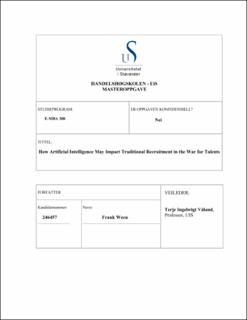| dc.contributor.advisor | Våland, Terje Ingebrigt | |
| dc.contributor.author | Ween, Frank | |
| dc.date.accessioned | 2021-02-17T09:17:15Z | |
| dc.date.available | 2021-02-17T09:17:15Z | |
| dc.date.issued | 2020-11 | |
| dc.identifier.uri | https://hdl.handle.net/11250/2728595 | |
| dc.description | Executive Master’s thesis in Business Administration | en_US |
| dc.description.abstract | The globalisation and the changes in the demographics within the G20 impacts greatly
the war for talents. The workforce is subject to a significant cutback due to the aging
population, and the globalisation impact of the workforce traveling across nations for
employment. The competition for recruiting talents may have shifted from a local to a
global perspective, whereas traditional recruitment methods may be insufficient securing
a sustainable workforce to the organisations.
The research explores how artificial intelligence (AI) may impact traditional recruitment
in the war for talents. To answer the thesis question, we explore the change and the
functionality concerning traditional recruitment versus AI hiring applications, the benefits
and pitfalls, the competitive advantage, and the impact on recruitment staff.
The study adopted an explorative research and qualitative data collection from semi
structured interviews across 13 organisations.
The results showed that the properties of the technology, enable hiring algorithms to
target marketing, and search the world wide web by processing big data in the war for
talent. The many benefits of using AI in the hiring process may have the opposite effect
due to poor datasets and inadequate validation of the algorithms. The pitfalls to using AI
technology may raise an ethical concern due to privacy and the lack of transparency in
the advanced algorithms. Organisations that fully integrate an AI-centered recruitment
system may be able to achieve a competitive or sustained advantage by continuous
development and improvement to the platforms, keeping the competitors behind. Due to
analyst and psychologist’s understanding of the AI involvement in the war for talents,
traditional “old school” sales-based recruiters will become obsolete. We conclude that AI
may have a superior impact on the traditional recruitment in the war for talents. | en_US |
| dc.language.iso | eng | en_US |
| dc.publisher | University of Stavanger, Norway | en_US |
| dc.relation.ispartofseries | Masteroppgave/UIS-HH/2020; | |
| dc.rights | Navngivelse 4.0 Internasjonal | * |
| dc.rights.uri | http://creativecommons.org/licenses/by/4.0/deed.no | * |
| dc.subject | E-recruitment | en_US |
| dc.subject | artificial intelligence | en_US |
| dc.subject | rekruttering | en_US |
| dc.subject | bias | en_US |
| dc.subject | hiring algorithm | en_US |
| dc.title | How Artificial Intelligence May Impact Traditional Recruitment in the War for Talents | en_US |
| dc.type | Master thesis | en_US |
| dc.subject.nsi | VDP::Social science: 200::Economics: 210::Business: 213 | en_US |

